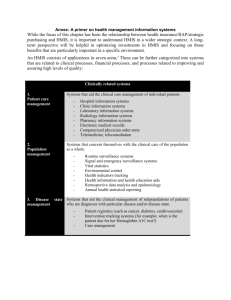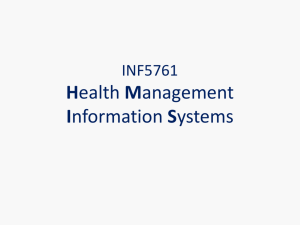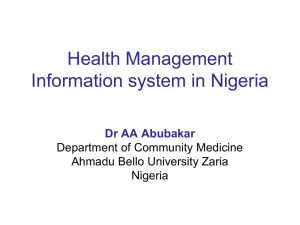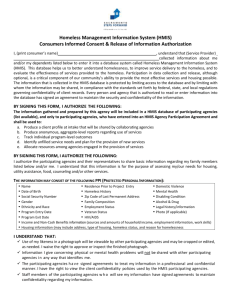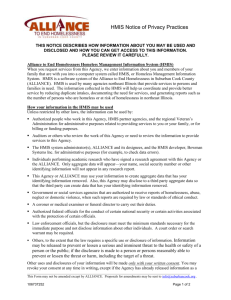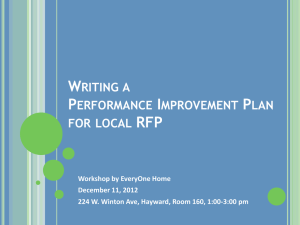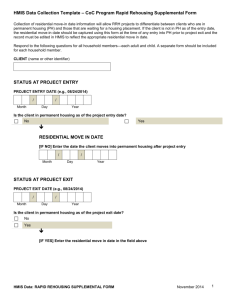homeless management information system privacy
advertisement
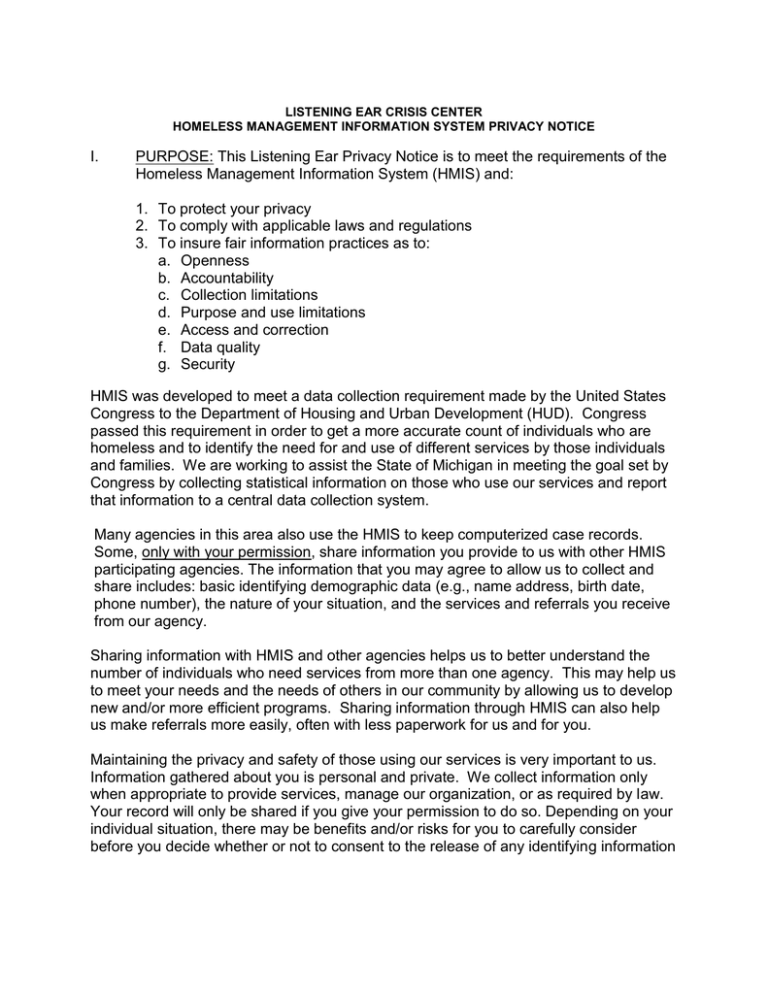
LISTENING EAR CRISIS CENTER HOMELESS MANAGEMENT INFORMATION SYSTEM PRIVACY NOTICE I. PURPOSE: This Listening Ear Privacy Notice is to meet the requirements of the Homeless Management Information System (HMIS) and: 1. To protect your privacy 2. To comply with applicable laws and regulations 3. To insure fair information practices as to: a. Openness b. Accountability c. Collection limitations d. Purpose and use limitations e. Access and correction f. Data quality g. Security HMIS was developed to meet a data collection requirement made by the United States Congress to the Department of Housing and Urban Development (HUD). Congress passed this requirement in order to get a more accurate count of individuals who are homeless and to identify the need for and use of different services by those individuals and families. We are working to assist the State of Michigan in meeting the goal set by Congress by collecting statistical information on those who use our services and report that information to a central data collection system. Many agencies in this area also use the HMIS to keep computerized case records. Some, only with your permission, share information you provide to us with other HMIS participating agencies. The information that you may agree to allow us to collect and share includes: basic identifying demographic data (e.g., name address, birth date, phone number), the nature of your situation, and the services and referrals you receive from our agency. Sharing information with HMIS and other agencies helps us to better understand the number of individuals who need services from more than one agency. This may help us to meet your needs and the needs of others in our community by allowing us to develop new and/or more efficient programs. Sharing information through HMIS can also help us make referrals more easily, often with less paperwork for us and for you. Maintaining the privacy and safety of those using our services is very important to us. Information gathered about you is personal and private. We collect information only when appropriate to provide services, manage our organization, or as required by law. Your record will only be shared if you give your permission to do so. Depending on your individual situation, there may be benefits and/or risks for you to carefully consider before you decide whether or not to consent to the release of any identifying information to another agency. You also have the right to request that your name be entered in the system as “un-named”. You cannot and will not be denied services that you would otherwise qualify for if you choose not to share information. Please note that even if you do not want your information shared with other agencies or your actual name entered into the system, we must still report some information to the central data collection system, which contains provisions to protect your name and privacy, because of our federal and state requirements. The Michigan Coalition Against Homelessness administers the MSHMIS database in collaboration with Michigan State Housing Development Authority. II. STATEMENT OF POLICY: Compliance: Listening Ear has a confidentiality policy that has been approved by its Board of Directors. In addition, Listening Ear privacy practices will comply with all applicable laws governing your HMIS privacy/confidentiality. Applicable standards include, but are not limited to the following, not all of which apply to Listening Ear’s use of HMIS. Federal Register Vol. 69, No. 146 (HMIS FR 4848-N-02) (Federal statute governing HMIS information). HIPAA - the Health Insurance Portability and Accountability Act. 42 CFR Part 2. – (Federal statute governing drug and alcohol treatment). Negotiated QSOBAA(s) - Inter-agency sharing agreement(s). Even if you choose to allow us to share information with other agencies, records about substance abuse, physical and mental health, HIV, and domestic violence will not be shared without your specific permission. III. IV. USE OF INFORMATION: Protected Personal Information (PPI), your specific identifying information, can be used only for the following purposes: To provide or coordinate services with client consent; For functions related to payment or reimbursement for services; To carry out administrative functions such as legal, audit, personnel, planning, oversight and management functions; Where a disclosure is required by law and disclosure complies with and is limited to the requirements of the law such as in a medical emergency, to report a crime against staff of Listening Ear, or to avert a serious threat to health and safety; and For creating de-personalized identification for unduplicated counting. HOW YOUR INFORMATION WILL BE KEPT SECURE: Protecting your safety, privacy, and confidentiality is of paramount importance to us. Through training, policies and procedures, and the server/database firewall we have done several things to make sure your information kept safe and secure: V. The computer program we use has the highest degree of security protection available. Only trained and authorized individuals will enter or view your personal information. Your name and other identifying information will not be contained in HMIS reports that are issued to local, state, or national agencies. Employees receive training in privacy protection agree to follow strict confidentiality standards before using the system. The server/database/software only allows authorized individuals access to the information. Only those who should see certain information will be allowed to see that information. The server/database will communicate using 128-bit encryption – an Internet technology intended to keep information private while it is transported back and forth across the internet. The server/database exists behind a firewall – a device meant to keep hackers/crackers/viruses/etc. away from the server. The main database will be kept physically secure, meaning only authorized personnel will have access to the server/database. System Administrators employed by The Michigan Coalition Against Homelessness and a local Lead Agency support the daily operation of the database. Administration of the database is governed by agreements that limit the use of personal information to providing administrative support and generating reports using aggregated information. These agreements further insure the confidentiality of your personal information. BENEFITS OF HMIS AND AGENCY INFORMATION SHARING: Information you provide to us can play an important role in our ability and the ability of other agencies to continue to provide the services that you and others in our community are requesting. Allowing us to share your real name, even in the absence of other information results in a more accurate count of individuals and the services they use. The security system is designed to create a code that will protect your identity on the system. A more accurate count is important because it can help us and other agencies: Better demonstrate the need for services and the specific types of assistance needed in our area. Obtain more money and other resources to provide services. Plan and deliver quality services to you and your family. Assist the agency to improve its work with families and individuals who are homeless. Keep required statistics for state and federal funders (such as HUD). You may choose to agree to share additional information with one or more HMIS participating agency in order to: Promote coordination of services so your needs are better met. Make referrals easier by reducing paperwork Avoid having to repeat as much information to get assistance from other agencies VI. RISKS OF SHARING INFORMATION SHARING: While the HMIS system was designed to promote better services for those who are homeless or might become homeless, there are risks (explained below) that may lead you to choose to do one or more of the following: Allow only your name, gender, year of birth, and the last four digits of your Social Security number (optional) to be shared with all participating agencies. All other information, including your date of birth, full SS#, where you are being served and your particular situation, are kept confidential or shared with only select agencies. Allow some statistical or demographic information to be shared with select other agencies, but do not allow other more personal data such as health, mental health, drug/alcohol use history or domestic violence information to be shared. Close all information including identifying information from all sharing. This means only Listening Ear Crisis Center and System Administrative staff see the information. Use an un-named or anonymous client ID so that your name is not included on the database, even within the agency that is serving you. You feel uncomfortable having other agencies see your name or other information. You are concerned because you know somebody who works for an agency using HMIS. There may be physical harm or other negative consequences to you or members of your family if someone found out you sought help, particularly if you or your children have experienced domestic violence, sexual assault, stalking, or child abuse. VII. RECORD ACCESS AND CORRECTION: Provisions will be maintained for the access to and corrections of PPI records. You may inspect and have a copy of your personal information that we maintain. We will offer to explain any information that you may not understand. We will consider a request from you for correction of inaccurate or incomplete personal information that we maintain about you. If we agree that the information is inaccurate or incomplete, we may delete it or we may choose to mark it as inaccurate or incomplete and to supplement it with additional information. To inspect, get a copy of, or ask for correction of your information you may contact Listening Ear at 107 E. Illinois, P.O. Box 800, Mt. Pleasant, MI 48804-0800 and make this request. We may deny your request for inspection or copying of personal information if: i. Information is compiled in reasonable anticipation of litigation or comparable proceedings ii. Information about another individual other than the agency staff would be disclosed iii. Information was obtained under a promise of confidentiality other than a promise from this provider and disclosure would reveal the source of the information; iv. Information disclosure would be reasonably likely to endanger the life or physical safety of any individual. You may be denied access to your personal information in the case of repeated or harassing requests for access or correction. However, if we deny your request, we will explain the reason for the denial, and documentation will be provided to you regarding the request and reason for denial and be made a part of the case record. All person(s) served by the agency have the right to complain and the means to seek a resolution to complaints. If you believe your rights have been violated, please contact the program’s immediate supervisor within ten working days of the grievance to discuss the grievance or the results of the discussion with the staff member involved according to the Grievance Policy. This Privacy Notice may be updated overtime and applies to all client information collected by Listening Ear. ACKNOWLEDGEMENT: I have had the opportunity to read, ask questions and clarify any information in the above Policy and I agree with the provisions contained therein. _______________________________________________________________ Consumer Signature Date __________________________________________ Consumer Printed Name
